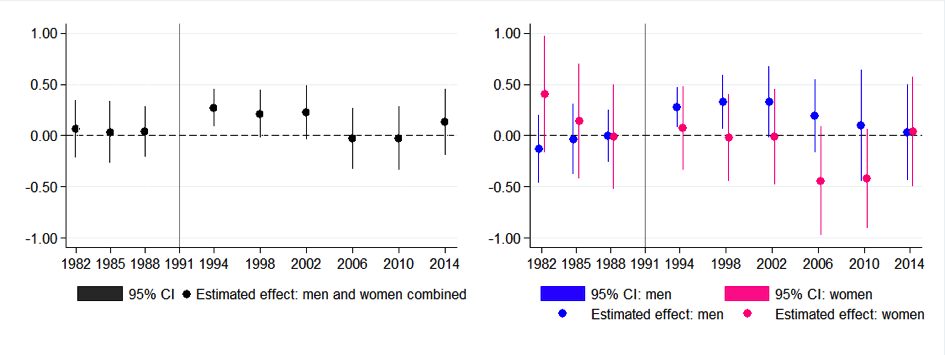Quotas aren’t anathema to meritocracy: they increase competence levels by displacing mediocre men, write Tim Besley, Olle Folke, Torsten Persson and Johanna Rickne
A common criticism against gender quotas is that they are anathema to meritocratic principles. This research on Sweden shows that the opposite can be true: Quotas actually increased the competence of politicians by leading to the displacement of mediocre men whether as candidates or leaders. The results may also be relevant for judging gender quotas in business.
More than 100 countries have a gender quota of some form or another in their political system.While accepting that they lean against underlying biases in gender representation, many opponents argue that such quotas offend meritocratic principles: women elected on the back of quotas need not be the most qualified and may displace qualified men. It would be nice to resolve these debates with hard evidence. However, relatively little is known about the impact of quotas on the competence of elected candidates – whether women or men.
Our study provides a unique window on quotas and, at the same time, pushes forward the measurement of competence in political selection. It uses the fact that, in 1993, Sweden’s Social Democratic party voluntarily introduced a strict gender quota for its candidates. In internal discussions of the reform, the party’s Women’s branch observed that some men were more critical than others. The quota became known colloquially as the “Crisis of the Mediocre Man,” since the incompetent men had the most to fear from an influx of women into politics.
Beyond the obvious point that the quota would give fewer positions to men, quotas can have strategic effects on political selection. Mediocre leaders have a strong incentive to surround themselves with mediocre followers, so as to bolster their chances of remaining in power. A less acknowledged role of quotas is to create a threat to such cozy arrangements. It is this idea that our research on Sweden has investigated. Our main finding is that gender quotas increase the competence of the political class in general, and among men in particular. Moreover, quotas are indeed bad news for mediocre male leaders who tend to be forced out.
Our research asks what happened when the central party organisation of the Social Democratic party imposed the quota on 285 local (municipal) political parties from the 1994 election and forward. Sweden has a strict party-list system where candidates for local council are elected in rank order. The quota mandated that the ballot be “zipped”, alternating male and female names throughout the list. Since a party’s elected representatives are counted from the top of the ballot, such zipping ensures a 50-50 balance in the proportion of men and women (or close to that for odd numbers of elected). On average, the proportion of elected women increased by 10 percentage points. But the starting point differed a great deal. Some localities were already near gender parity and not much affected by the reform. Others had low shares of women and saw a dramatic effect. Our study exploits this large variation.
The study also takes advantage of unique data to put forward a new way of gauging competence. Existing research has relied mostly on education levels. But our measure of competence relies on a comparison of the private incomes across people with the same education, occupation, age, and residence in the same geographical region (members of municipal councils in Sweden typically keep their private job). A competent politician, we argue, is a person who makes more than the median amongst politicians with similar characteristics. Remarkably, this competence measure is closely correlated with results from enlistments tests of the intelligence and leadership capacity of those who did military service. It is also related to measures of political success and the quality of service delivery.
Using our measure of competence, we find strong evidence of cozy arrangements prior to the quota, with mediocre leaders selecting mediocre followers. So what happened after the quota?
Within each local party, we compare the proportion of competent politicians in elections after the quota to the 1991 level. The figure below show some striking results. The left panel illustrates our estimates for politicians of both genders with black dots showing the change in the proportion of competent representatives in a party which is forced to increase their share of women (by 100 percentage points). The right panel splits the results by men and women (blue dots for men and pink dots for women). It shows distinctly that the average competence of male politicians increased in the places where the quota had a larger impact, and that the effect is concentrated to the three elections following the quota. On average, a higher female representation by 10 percentage points raised the proportion of competent men by 3 percentage points! For the competence of women, we observe little discernible effect.
Figure 1. Estimated impact of the gender quota on the fractions of competent politicians (left) and competent men and women separately (right)

Note: Dots denote point estimates and bars 95% confidence intervals.
Subdividing the men into leaders and followers reveals another interesting finding; there is clear evidence of a reduction in the proportion of male leaders (those at the top of the ballot) with mediocre competence. This suggests that quotas work in part by shifting incentives in the composing party ballots. Mediocre leaders are either kicked out or resign in the wake of more gender parity. Because new leaders – on average – are more competent, they feel less threatened by selecting more able candidates, which starts a virtuous circle of higher competence.
While we have focused on politics, the results may also be relevant for judging gender quotas in other organisations. Quotas for company boards currently exist in roughly ten countries and are on the agenda of various countries, as well as in the European Union. Arguably, analysing the impacts of board quotas is more complex than for politics. The policies often have long implementation periods as well as “pre-announced” plans or warnings. There are also ways around the rules, such as delisting from the stock market. These factors make it difficult to identify who precisely is affected by the change and who to compare them with. Nevertheless, some lessons from political parties could still apply. Many firms have a history of male-dominated leadership and are sometimes accused of having “locker-room” mentalities and cozy selection rules. These reinforce the selection of men, and leaders may feel comfortable being surrounded by non-threatening mediocrity. Just as in politics, therefore, a quota has the potential to undercut the dominance of a mediocre elite.
Notes:
- This blog post is based on the authors’ paper Gender Quotas and the Crisis of the Mediocre Man: Theory and Evidence from Sweden, in the American Economic Review (forthcoming). This article was first published in the LSE Business Review blog on 13 March 2017 and is being republished with relevant permissions.
- About the authors: Tim Besley is W Arthur Lewis Professor of Development Economics and School Professor of Economics and Political Science at LSE. He is also a member of the Steering Group of the International Growth Centre (IGC). He served on the Bank of England’s Monetary Policy Committee for three years. Professor Besley is also an Associate of STICERD’s Economic Organisation and Public Policy programme. He previously taught at Princeton University, and is a Research Fellow at the Institute for Fiscal Studies, and the Centre for Economic Policy Research. His work focuses mainly on issues in development economics, public economics and political economy. He has published widely on a variety of topics, mainly with a policy focus. Olle Folke is an Associate Professor in Politics at the Department of Government at Uppsala University, Sweden. His research is in political economics, comparative politics and politics and gender. Torsten Persson is Professor of Economics at Stockholm University and Centennial Professor at the London School of Economics, and has held visiting positions at leading universities as Harvard, Princeton and Berkeley. Persson is the 2008 President of the Econometric Society, and was President of the European Economic Association in 2003. His scientific prizes include the 1997 Yrjö Jahnsson Medal, given biannually to “the best young economist in Europe”. Persson’s work has spanned macroeconomics, international economics, and public economics, but he is most well-known for his articles and books on political economics. His current research focuses on development, civil war, and climate change. Johanna Rickne is an Associate Professor in Economics at the Swedish Institute for Social Research at Stockholm University. Her research is in labor economics, political economics, and gender economics.






2 Comments